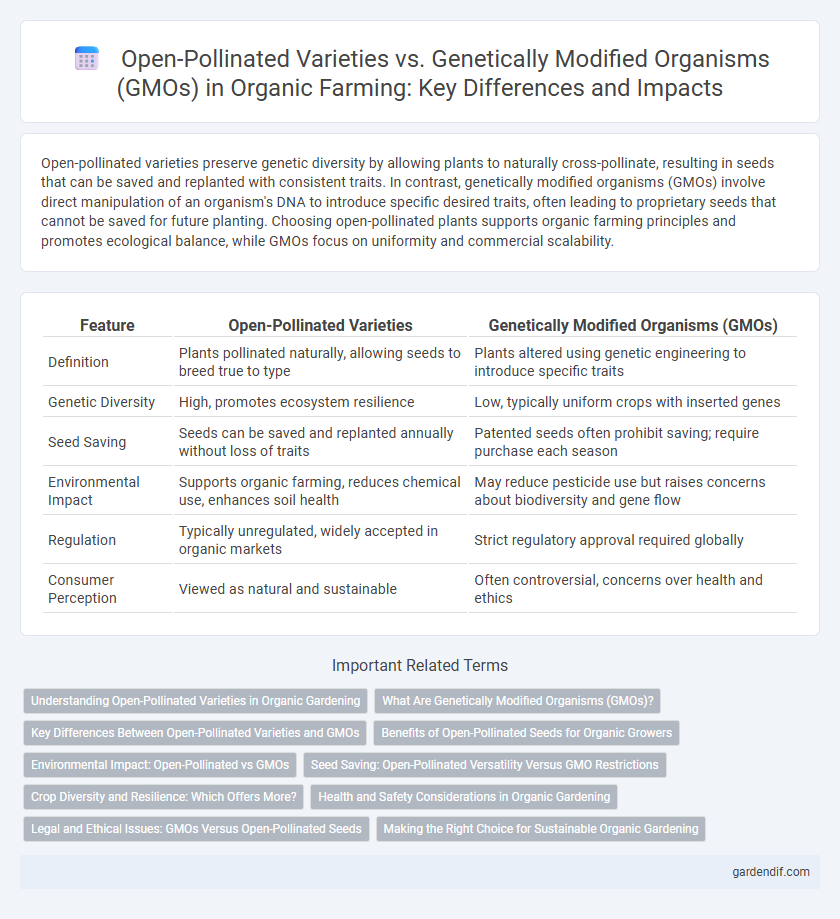
Open-pollinated varieties vs Genetically modified organisms (GMOs) Illustration
Open-pollinated varieties preserve genetic diversity by allowing plants to naturally cross-pollinate, resulting in seeds that can be saved and replanted with consistent traits. In contrast, genetically modified organisms (GMOs) involve direct manipulation of an organism's DNA to introduce specific desired traits, often leading to proprietary seeds that cannot be saved for future planting. Choosing open-pollinated plants supports organic farming principles and promotes ecological balance, while GMOs focus on uniformity and commercial scalability.
Table of Comparison
| Feature | Open-Pollinated Varieties | Genetically Modified Organisms (GMOs) |
|---|---|---|
| Definition | Plants pollinated naturally, allowing seeds to breed true to type | Plants altered using genetic engineering to introduce specific traits |
| Genetic Diversity | High, promotes ecosystem resilience | Low, typically uniform crops with inserted genes |
| Seed Saving | Seeds can be saved and replanted annually without loss of traits | Patented seeds often prohibit saving; require purchase each season |
| Environmental Impact | Supports organic farming, reduces chemical use, enhances soil health | May reduce pesticide use but raises concerns about biodiversity and gene flow |
| Regulation | Typically unregulated, widely accepted in organic markets | Strict regulatory approval required globally |
| Consumer Perception | Viewed as natural and sustainable | Often controversial, concerns over health and ethics |
Understanding Open-Pollinated Varieties in Organic Gardening
Open-pollinated varieties in organic gardening refer to plants that reproduce naturally through wind, insects, or self-pollination, preserving genetic diversity and allowing gardeners to save seeds for future planting. Unlike genetically modified organisms (GMOs), these varieties maintain traditional traits without synthetic alterations, aligning with organic principles that emphasize ecological balance and sustainability. Choosing open-pollinated seeds supports biodiversity and resilience in organic ecosystems, fostering healthy, adaptive crops free from genetic modification.
What Are Genetically Modified Organisms (GMOs)?
Genetically modified organisms (GMOs) are plants, animals, or microorganisms whose genetic material has been altered using biotechnology to introduce desirable traits such as pest resistance, herbicide tolerance, or enhanced nutritional content. These modifications enable GMOs to exhibit characteristics not found in naturally occurring varieties, differing fundamentally from open-pollinated varieties that rely on natural cross-pollination without genetic manipulation. The adoption of GMOs in agriculture aims to improve crop yields, reduce chemical inputs, and address food security challenges, although concerns about environmental and health impacts remain highly debated.
Key Differences Between Open-Pollinated Varieties and GMOs
Open-pollinated varieties reproduce through natural pollination methods, preserving genetic diversity and allowing seeds to be saved and replanted with consistent traits, while genetically modified organisms (GMOs) involve direct manipulation of DNA to introduce specific traits, often for pest resistance or herbicide tolerance. Open-pollinated seeds maintain environmental adaptation over generations, supporting organic farming principles, whereas GMOs often rely on proprietary technology and regulatory oversight for commercialization. The key difference lies in the breeding process, with open-pollinated varieties developed through traditional selection and GMOs created via biotechnological intervention.
Benefits of Open-Pollinated Seeds for Organic Growers
Open-pollinated seeds preserve genetic diversity and adapt naturally to local growing conditions, enhancing resilience in organic farming systems. These seeds allow organic growers to save and replant harvests, reducing dependency on commercial seed suppliers and lowering costs. The absence of genetic modification aligns with organic certification standards, supporting sustainable and eco-friendly agricultural practices.
Environmental Impact: Open-Pollinated vs GMOs
Open-pollinated varieties promote biodiversity by enabling seed saving and natural cross-pollination, which supports resilient ecosystems and reduces dependency on synthetic inputs. Genetically modified organisms (GMOs), while engineered for specific traits, may lead to reduced genetic diversity and unintended ecological consequences, including potential impacts on non-target species and soil health. Environmental assessments consistently highlight that open-pollinated crops foster sustainable agriculture through improved ecosystem services and long-term soil fertility compared to some GMO practices.
Seed Saving: Open-Pollinated Versatility Versus GMO Restrictions
Open-pollinated varieties allow farmers and gardeners to save seeds year after year, ensuring genetic diversity and adaptation to local growing conditions. In contrast, genetically modified organisms (GMOs) often come with legal restrictions and patent protections that prevent seed saving and require purchasing new seeds each season. This limitation on seed saving reduces farmer autonomy and increases dependence on biotech corporations.
Crop Diversity and Resilience: Which Offers More?
Open-pollinated varieties enhance crop diversity by preserving genetic traits through natural pollination, promoting resilience to local pests and climatic conditions. Genetically modified organisms (GMOs) often target specific traits, potentially narrowing genetic variation despite offering resistance to certain diseases or herbicides. For sustainable agriculture and long-term ecosystem stability, open-pollinated crops typically provide greater diversity and adaptability than GMOs.
Health and Safety Considerations in Organic Gardening
Open-pollinated varieties in organic gardening prioritize natural plant reproduction without synthetic intervention, reducing risks associated with genetically modified organisms (GMOs) such as allergenicity and gene transfer to non-target species. Health and safety considerations emphasize the avoidance of GMOs due to potential unknown long-term effects on human health and environmental ecosystems. Organic standards strictly prohibit GMOs, supporting biodiversity and promoting safer, chemical-free food production systems.
Legal and Ethical Issues: GMOs Versus Open-Pollinated Seeds
Open-pollinated seeds, favored in organic farming, comply with legal frameworks that protect biodiversity and farmers' rights by enabling seed saving and exchange without restrictions. In contrast, genetically modified organisms (GMOs) are often subject to stringent patent laws, limiting farmers' ability to save and reuse seeds, raising ethical concerns about corporate control and biodiversity loss. The legal enforcement of GMO patents conflicts with traditional agricultural practices, sparking debates over food sovereignty and sustainable farming ethics.
Making the Right Choice for Sustainable Organic Gardening
Open-pollinated varieties preserve genetic diversity by allowing natural pollination and seed saving, which supports sustainable organic gardening practices and ecosystem resilience. Genetically modified organisms (GMOs) introduce specific traits through gene editing but often face regulatory restrictions and consumer concerns in organic agriculture. Choosing open-pollinated seeds encourages biodiversity, long-term soil health, and adaptation to local growing conditions, aligning with organic sustainability goals.
Open-pollinated varieties vs Genetically modified organisms (GMOs) Infographic

 gardendif.com
gardendif.com